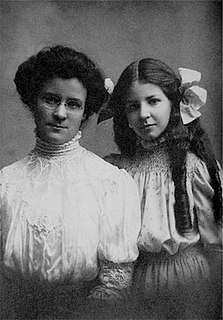A Quote by Susan Cain
.. it makes sense that introverts are uniquely good at leading intiative-takers. Because of their inclination to listen to others and lack of interest in dominating social situations, introverts are more likely to hear and implement suggestions. Having benefited from the talents of their followers, they are then likely to motivate them to be even more proactive. Introverted leaders create a virtious circle of proactivity.
Related Quotes
Remember that introverts react not only to new people, but also to new places and events. So don’t mistake a child’s caution in new situations for an inability to relate to others. He’s recoiling from novelty or overstimulation, not from human contact. Introverts are just as likely as the next kid to seek others’ company, though often in smaller doses
the present Western civilization ... is dominated by the extravert viewpoint. There are plenty of reasons for this domination: extraverts are more vocal than introverts; they are more numerous, apparently in the ratio of three to one; and they are accessible and understandable, whereas the introverts are not readily understandable, even to each other, and are likely to be thoroughly incomprehensible to the extraverts.
Some findings reveal extroverts as more adept at reading nonverbal cues, and attribute this to the extrovert's greater interest and experience with social interactions. Another line of research using subliminal images of facial emotion found introverts to be more sensitive to the differences, and hypothesized that this may be why introverts regulate the amount of incoming social information.
While there are relatively few extreme introverts or extroverts, most of us lean in one direction or the other. If we lean more toward introversion, we'll generally prefer less social activity than more extroverted people. One inclination is not 'better' than another, but our culture can make it seem as if extroverts have a social advantage.
Many Introverts are also "highly sensitive," which sounds poetic, but is actually a technical term in psychology. If you are a sensitive sort, then you're more apt than the average person to feel pleasantly overwhelmed by Beethoven's "Moonlight Sonata" or a well-turned phrase or an act of extraordinary kindness. You may be quicker than others to feel sickened by violence and ugliness, and you likely have a very strong conscience.
INTROVERTS are especially vulnerable to challenges like marital tension, a parent’s death, or abuse. They’re more likely than their peers to react to these events with depression, anxiety, and shyness. Indeed, about a quarter of Kagan’s high-reactive kids suffer from some degree of the condition known as “social anxiety disorder,” a chronic and disabling form of shyness.
Introverts tend to internalize problems. In other words, we place the source of problems within and blame ourselves. Though introverts may also externalize and see others as the problem, it's more convenient to keep the problem "in house." Internalizers tend to be reliable and responsible, but we can also be very hard on ourselves.
Words in the mind are like colors on the palette of the artist. The more colors we have access to, the easier it is to create a captivating picture on the canvas, and the more practice we give to using those many colors appropriately and uniquely, the more likely we will be to create a masterpiece of self expression.
What makes a good follower? The single most important characteristic may well be a willingness to tell the truth. In a world of growing complexity leaders are increasingly dependent on their subordinates for good information, whether the leaders want to hear it or not. Followers who tell the truth and leaders who listen to it are an unbeatable combination.































